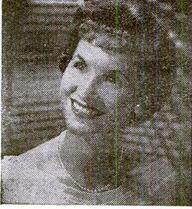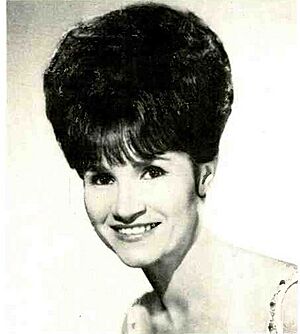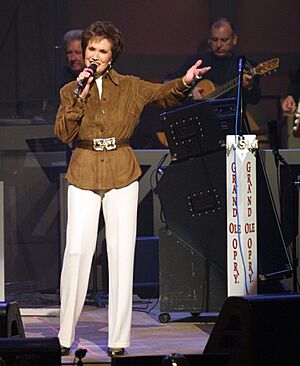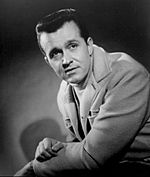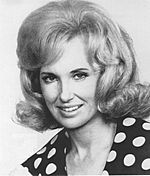Jan Howard facts for kids
Quick facts for kids
Jan Howard
|
|
|---|---|
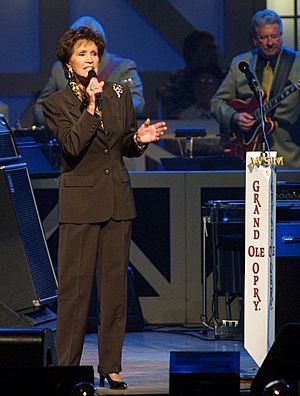
Howard at the Grand Ole Opry, 2000s
|
|
| Born |
Lula Grace Johnson
March 13, 1929 West Plains, Missouri, U.S.
|
| Died | March 28, 2020 (aged 91) Gallatin, Tennessee, U.S.
|
| Resting place | Spring Hill Cemetery (Nashville, Tennessee) |
| Occupation |
|
| Years active | 1958–2020 |
| Spouse(s) |
|
| Children | 4 |
| Musical career | |
| Genres | |
| Instruments | Vocals |
| Labels |
|
Jan Howard (born Lula Grace Johnson; March 13, 1929 – March 28, 2020) was an American singer, songwriter, and author. She became famous for her country music songs. She had 30 songs appear on the Billboard country music charts. Jan was also a member of the famous Grand Ole Opry and was nominated for several big awards. She wrote poems and even published her own life story. She was married to the well-known country songwriter Harlan Howard.
Jan grew up mostly in West Plains, Missouri. Her family moved around a lot when she was a child. She got married as a teenager and moved many times with her husband. They lived in places like Colorado, Kansas, Illinois, and Missouri. Jan worked many part-time jobs to help support her family, which included three children. She divorced her first husband in 1953. She then married her second husband that same year. After this marriage ended, she moved with her children to Los Angeles, California, in 1955.
In 1957, she met and married Harlan Howard. Early in their marriage, Harlan found out she could sing. He was impressed by her voice and helped her record special tapes called "demos." These tapes were heard by other country artists. This led to her first record deal with Challenge Records. Jan had her first big country hit in 1960 with a song called "The One You Slip Around With". As her husband's songwriting became more successful, Jan's singing career also grew. She had her biggest hits after signing with Decca Records. Her major songs included "Evil on Your Mind" (1966) and "My Son" (1968). She also had many hits working with Bill Anderson. Their song "For Loving You" (1967) even reached number one! They continued to record and tour together until the mid-1970s.
By 1973, Jan had gone through some very tough times, including the loss of two of her children. She also divorced Harlan Howard. She felt very sad and almost stopped her music career. But other performers encouraged her to keep going. She released more albums and songs into the 1980s. At the same time, she started focusing on other interests, like writing. In 1987, Jan published her popular autobiography called Sunshine and Shadow. She also wrote poems and short stories. She stayed active by appearing regularly on the Grand Ole Opry. She also worked with U.S. military veterans through different programs. She gave money to charities and spoke at events to raise money.
Contents
Early Life and Family
Childhood and Teenage Years (1929–1945)
Jan Howard was born Lula Grace Johnson in West Plains, Missouri. Her parents were Linnie and Rolla Johnson. She was the eighth of 11 children. Sadly, two of her siblings passed away before they were two years old. Jan's father was a brick mason. He got help finding work from a program called the Works Progress Administration during the Great Depression. When Jan was young, her family moved often. They moved to towns like Kansas City, Birch Tree, and Oklahoma City. This was because her father looked for work and better homes. When she was eight, her family briefly returned to West Plains.
As a child, Jan loved listening to the Grand Ole Opry radio show with her father. They often listened to hear the Opry star, Texas Ruby. In 1943, Jan's mother and father separated for a short time. To help her family, Jan worked as a dishwasher at a local cafe. The cafe owner could not pay her with money. Instead, he gave Jan's family food for their weekly meals. When she was 16, she got a job at a drugstore.
In 1945, Jan married Mearle Wood and left high school. Mearle joined the military soon after they married. He found military housing for Jan, and they moved to Waynesville, Missouri. In their first home, they shared a house with another military couple. Jan briefly went back to her parents' house after finding out Mearle was seeing someone else. But when Mearle moved to Little Rock, Arkansas, Jan joined him there.
Early Adulthood and Challenges (1946–1957)
Jan gave birth to three sons between the late 1940s and early 1950s. Their names were Jimmy, Carter, and David. The young family kept moving as Mearle took different jobs. They lived in cities like Colorado Springs, Colorado, Pittsburg, Kansas, and Greeley, Colorado. While in Greeley, their house caught fire. Jan said she woke up to the smell of smoke in the middle of the night. She saved her three children from the smoke. Mearle was not home at the time. The family eventually moved back to West Plains. Jan and her three sons then went to her family's home in Oklahoma. "Until midnight, Mom and Daddy kept us hidden. Then, with as much money as we could spare, we boarded a Greyhound bus for Oklahoma City," Jan wrote. In 1953, she divorced Mearle Wood.
While living with her brother, Jan met his friend, Lowell "Smitty" Smith. Smitty was also in the military. They fell in love and married in 1953. The family moved with Smitty to a neighborhood on a military base. Jan also got a part-time job in a "tea room" at a department store. In 1954, she gave birth to a fourth child, a daughter named Janet Louise Smith. Sadly, the baby had many health problems and passed away shortly after being born.
The family then rented a new home on a military base in Warrensburg, Missouri. The couple bought furniture for their home using credit. Smitty was then moved to Panama for his military duties. While Smitty moved, Jan started getting ready to join him there. However, she soon found out that he was still married to another woman. When she learned this, she ended the relationship. She moved with her sons to Los Angeles, California, in 1955.
Jan worked many part-time jobs after moving to Los Angeles. "I must have had 30 jobs in the next 30 days," she wrote. She eventually got a job as a secretary. She later said that the job was hard because she could not "type or take shorthand". In 1957, she met a country music songwriter named Harlan Howard. They met through her friend, who also knew country artist Wynn Stewart. Within a month of meeting, Jan and Harlan were married on May 10, 1957, in Las Vegas, Nevada.
Singing Career
Early Success (1958–1963)
At home, Jan often sang to herself while doing chores. One day, Harlan came home early and heard her singing. "I didn't know you could sing," he said. That same day, he played guitar while Jan sang his song "Mommy for a Day." Harlan realized he could use his wife's singing voice to make "demo" records. These were special recordings used to show songs to other artists. The Howards recorded the demo tape in their bathroom in Gardena, California. It was then sent to a music publisher in Nashville, Tennessee. The song was later recorded and became a hit for Kitty Wells. Jan also sang demos for other songs like "Pick Me Up on Your Way Down" and "I Wish I Could Fall in Love Again." Both of these songs were recorded by Charlie Walker.
Harlan took Jan's demo tapes to Joe Johnson at Challenge Records. Johnson liked the songs, but Harlan would only let him have them if he signed Jan to the record label. Johnson agreed, and she officially signed with Challenge Records in 1958. After signing, the label changed her name from "Lula Grace Howard" to "Jan Howard."
Jan then teamed up with California country artist, Wynn Stewart. They recorded several songs together. Their first song, "Yankee Go Home," was released by Challenge Records in 1959. They also released "Wrong Company." This song was played on country radio stations and reached number 26 on the Billboard country chart in 1960. At the same time, Harlan's songwriting career was also taking off. This led the couple to visit many country music clubs in Los Angeles. By meeting other country artists at these clubs, Jan got chances to perform herself. One of her first performances was on the TV show Town Hall Party. However, Jan was nervous about performing. In her autobiography, she remembered the show: "The band started 'Pick Me Up on Your Way Down' and someone pushed me onstage. After that, everything was a total blank...If I'd been given warning, I'd have been long gone."
Because "Wrong Company" was a success, Joe Johnson wanted Jan to release a solo song. Johnson chose "The One You Slip Around With", which Harlan Howard and Fuzzy Owen wrote. Released in late 1959, the song reached number 13 on the Billboard country chart in 1960. She remembered hearing the song on the radio for the first time: "For once, I was proud of what I heard but it was as though I was listening to someone else, not me." The song's success helped Jan win the "Most Promising Country Female" award from both Billboard and Jukebox Operators. The Howard family also moved to Nashville in 1960. There, Jan regularly appeared on the "Prince Albert" part of the Grand Ole Opry. Jan met many country artists while performing there, especially Patsy Cline. The two became close friends.
The Howards bought a four-bedroom home in Madison, a suburb of Nashville. Harlan turned the garage into a den to use for writing songs. Jan was still with Challenge Records and kept recording demo songs for her husband. One demo she sang was for "I Fall to Pieces", which Harlan wrote with Hank Cochran. Jan liked the song so much that she wanted to record it for herself. But Harlan offered the song to Patsy Cline first. Cline's version became a huge hit. When Jan was not recording demos or at home, she toured with other country artists. One of her first tours was in Florida with June Carter, Skeeter Davis, George Jones, Buck Owens, and Faron Young.
In 1962, Capitol Records bought Jan's recording contract from Challenge. Jan said her first recording sessions with Capitol were "a disaster." She called Ken Nelson and asked him to record her instead. Nelson agreed and sent her to Los Angeles for their next session. At Capitol, some people thought she should sing pop songs instead of country. So, Nelson had her record a mix of pop songs and country covers. From these sessions, Jan's first album, Sweet and Sentimental, was released in 1962. The album had covers of many songs, including her husband's "He Called Me Baby" and "Heartaches by the Number". Even though she recorded several songs at Capitol, Jan only had one song that made it onto the charts with them: a cover of "I Wish I Was a Single Girl Again." The song reached number 27 on the Billboard country chart in 1963.
Peak Commercial Success (1964–1974)
By 1964, Jan's singing career was getting bigger. Because she was touring so much, she hired a housekeeper to help at home. Harlan Howard also found a booking agent for her shows. He arranged for Hubert Long to work with Jan. Jan said that Long booked many shows because the Howards owed the IRS $20,000 in taxes. At concerts, she was earning about $500–600 per show. At the same time, Harlan helped his wife get a new record deal with Decca Records in 1964. She soon started working with producer, Owen Bradley. Her first song released by Decca was "What Makes a Man Wander." It reached the top 25 on the Billboard country chart in 1965.
Bradley and Jan had trouble finding a good song for her next release. They soon found a song written by Harlan called "Evil on Your Mind". Jan and Bradley liked the song and thought it could be a hit. Released as a single in 1966, "Evil on Your Mind" reached number five on the Billboard country singles chart. This became her highest-charting solo song. Since then, it has been seen as her most famous song. Its success led Decca to release her second album. In September 1966, Jan Howard Sings Evil on Your Mind reached number 10 on the Billboard country albums chart.
The success of "Evil on Your Mind" meant Jan had many more concert bookings. "If I thought I'd been busy before, it was a vacation compared to now," Jan wrote. In 1966, she played a tour with other artists that ended at the Hollywood Bowl in California. She also played a show in Detroit, Michigan, that had about 24,000 people. When she wasn't touring, Jan was in the recording studio. Her next song release was "Bad Seed", which reached number ten on the Billboard country chart in 1966. An album with the same name followed in 1967. It reached number 13 on the country albums chart. Her fourth album, This Is Jan Howard Country, was released in October 1967 and reached the top ten on the Billboard country chart. Her other hit songs during this time included "Roll Over and Play Dead" (1967), "Any Old Way You Do" (1967), and "Count Your Blessings, Woman" (1968). Music writers and critics also noticed her music. In Billboard's 1968 review, one writer said her singing was "loaded with sincerity and heart." Nashville music journalist Robert K. Oermann wrote in 2003, "Jan specialized in up-tempo tunes, usually filled with feisty female lyrics provided by Harlan...She brought feminine spunk to the Nashville Sound."
Jan also started touring and recording with Bill Anderson during this time. Both artists were on the same record label and were booked by Hubert Long. On the road, they would sometimes sing together, often performing "I Know You're Married But I Love You Still." Anderson and Howard asked Owen Bradley about recording duets. Bradley agreed, and they started with their first song in 1965. Their second song was "For Loving You" in 1967. It became Jan's first and only song to reach number one on the Billboard country chart. Their first album together, also called For Loving You, reached number six on the country albums chart in 1968. Now a successful music team, Jan joined Anderson's roadshow and became part of his TV show. The show was mostly filmed in Windsor, Ontario, which meant Jan had to fly there every two weeks for filming. Working with Anderson gave her a steady income.
In 1968, Jan's oldest son, Jimmy, was drafted into the army to fight in the Vietnam War. Jan wrote to him often, and one letter was even turned into a song. Her second son (Carter Howard) and Bill Anderson inspired Jan to record it. When she showed the letter to Owen Bradley, he insisted she record it. Decca called the letter "My Son". It was released as a single in 1968 and reached number 15 on the Billboard country chart. Jan received over 5,000 letters from soldiers and their families after the song came out. "They said they felt like it was for them," Jan said. The song was later nominated for Best Female Country Vocal Performance at the Grammy Awards. Before the end of 1968, Jimmy Howard was killed in battle at age 21.
In July 1969, Jan's seventh album, which was self-titled, was released. It reached number 25 on the Billboard country albums chart. In 1970, Jan released an album of patriotic music called For God and Country. It was partly inspired by a poem her son Carter had written called "I Am." The poem was set to music and featured on her album. Jan also decided to dedicate the album to Jimmy. "It was the most difficult album I'd ever recorded, yet one that would always be the closest to my heart," Jan wrote in 1987. Despite personal difficulties, Jan kept working as part of "The Bill Anderson Show." In March 1970, the duet released their second album called If It's All the Same to You. Its title song became a top ten country hit. They continued recording and touring together until 1973. Their other songs that reached the top ten on the Billboard country chart were "Someday We'll Be Together" (1970) and "Dis-Satisfied" (1971). By 1973, Jan's latest songs were reaching lower positions on the Billboard country chart. Jan said she asked Owen Bradley about working with a new producer at Decca. Bradley said no, and Jan left the label in 1974.
New Directions and Later Years (1975–2020)
By 1975, Jan had left Bill Anderson's road and TV shows. "I wasn't mentally or physically able to keep up the pace doing the show full time," she later wrote. Anderson replaced her with a newer artist named Mary Lou Turner, and Jan was working by herself again. She had fewer concert dates than before. She was working with temporary bands who "would have made good electricians," Jan said. Some nights, she performed with little or no instruments. During one show, she performed on the back of a flatbed truck. "Many nights I'd be so depressed and ashamed, I'd go back to the motel, cry and go to sleep," Jan wrote. During this time, she started touring with Johnny Cash and June Carter Cash as part of their show. "It'll do you good," the Cashes told her. Jan toured with their show across the country and even internationally. This included shows in Hawaii and Australia. Jan not only toured with Cash, but she also joined him in the recording studio. She sang background vocals on some of his biggest hits. This included singing the line, "Mama sang tenor," on his 1969 hit "Daddy Sang Bass". She also sang background vocals on Cash's 1963 hit "Ring of Fire".
Jan also returned to the recording studio. During this time, she was a neighbor of Nashville producer, Larry Butler, who produced her next album. Called Sincerely, Jan Howard, it was released on GRT Records. The album's first and only song to chart was "Seein' Is Believin'", which reached just outside the top 40 of the Billboard country chart. In 1977, she briefly signed with Con Brio Records. There, she had three smaller hits on the country chart. This included the song, "To Love a Rolling Stone" (1978), which was her last song to appear on the charts. In the late 1970s, she also toured as part of Tammy Wynette's roadshow, singing both background and lead vocals.
In the early 1980s, record producer and friend Pete Drake asked Jan to be part of a new album series for Grand Ole Opry members. She agreed and worked with Drake on her next album. Called Stars of the Grand Ole Opry, the album was released by First Generation Records in April 1981. It had new versions of Jan's hits and some new songs. Jan continued recording during the 1980s. Her next album was released on AVI Records in 1983, called Tainted Love. The album's title song was a cover of the hit originally written by Ed Cobb. Cobb also helped produce the album. In 1985, Jan was part of a project between MCA and Dot Records, which included several other experienced artists. From this project, a self-titled album was released in 1985. Produced by Billy Strange, it was Jan's last album release.
In the 1990s, Jan slowed down her singing career. Jan talked about her career slowing down and her love for singing in her autobiography: "I love to sing and hope that, for a long time to come, God will give me the opportunity to do so. And when he tells me to quit, I hope I have the sense to follow His advice." While she worked sometimes, she mainly performed as part of the Grand Ole Opry cast. In the 2000s, Jan was added to the Missouri Country Music Hall of Fame. She also released a collection of her recorded music. She has since appeared on albums by other artists. In 2007, she recorded a song with Bill Anderson and Vince Gill for Anderson's album, Whisperin' Bluegrass. In 2017, Jan and Jessi Colter appeared on Jeannie Seely's album Written in Song, singing on the song "We're Still Hangin' in There, Ain't We Jessi." In 2019, she celebrated her 90th birthday at the Opry. This made her the show's oldest living member.
Musical Style and Impact
Jan Howard's music style was based in country and Nashville Sound genres. Her music has been described as a key part of country music's history. Stephen Thomas Erlewine of Allmusic talked about her singing style in his review of The Very Best of Wynn Stewart and Jan Howard CD in 2004. He said, "Howard is a strong, straight-ahead, hardcore country singer, and the sides collected here are excellent, unheralded pure honky-tonk with a Bakersfield tinge." Robert K. Oermann commented on Jan's "brassy" singing style. He noted that her Decca recordings were "downright gutsy," "sassy," and "self-assured." Oermann also spoke about Jan's impact as an artist: "Jan opened the door for many more Nashville Sound stylists. Marion Worth, Margie Bowes, Connie Smith, Jeannie Seely and Connie Hall climbed the charts."
Jan Howard is also remembered for her success in music sales. Sandra Brennan of Allmusic called her "one of the hottest female vocalists of the 1960s." Ken Burns called her "one of the most popular female country artists of the 1960s and early 1970s." Her impact has also been mentioned in recent years. In 2018, she was ranked among the "100 Greatest Women of Country Music" in a poll by Country Universe. In 2005, Jan's song, "Evil on Your Mind," was listed as one of country music's "500 greatest singles" in the book Heartaches by the Number. In 1971, she became a member of the Grand Ole Opry. She continued to appear there until 2019.
Writing and Other Work
Songwriting (1966–1983)
Besides singing, Jan Howard wrote songs for herself and for other artists. One of her first songs released was "Crying for Love." It appeared on her 1966 album Jan Howard Sings Evil on Your Mind. Jan's own songs continued to appear on her albums over time. Songs she wrote herself were on the albums For God and Country, Love Is Like a Spinning Wheel, Sincerely, Jan Howard, and Stars of the Grand Ole Opry. Songs she wrote were also recorded by other artists. In 1966, she wrote "It's All Over But the Crying," which became a big hit for Kitty Wells. That same year, the song received an award for being one of the "Most Frequently Played Tracks" from the BMI Awards. Jan later called the situation "ironic" because her husband (Harlan Howard) was more famous for songwriting. At the time of the awards dinner, the Howards had separated, but they attended the event together.
Jan also wrote songs with other artists. With Bill Anderson, she wrote "I Never Once Stopped Loving You". This became a big hit for Connie Smith. They also co-wrote "Dis-Satisfied," which they made a hit themselves as a duet. Jan's son, Carter, also helped write the song. The song appeared on their album Bill and Jan (Or Jan and Bill). Jan also wrote "Love Is a Sometimes Thing" by herself. This song was recorded and became a big hit for Bill Anderson. She also released it as a single herself around the same time. These songs also won BMI Songwriters Awards. In 1980, she worked with Tammy Wynette to write the song "Only the Names Have Been Changed." The song appeared on Wynette's album Only Lonely Sometimes. Jan's last writing credit is on the song "My Friend," which appeared on her 1983 album Tainted Love.
Autobiography and Other Writing (1987–2020)
For several years, friends told Jan that she should write her autobiography (her life story). She would say, "Yeah, it would make a great soap opera." Jan had written an outline for the book, but she put it aside for three years before working on it again. In 1979, she was visiting a friend in Florida. "It was a very bad time in my life. I was in Florida and, I didn't know whether I was going to walk into the ocean or not. And I can't swim," Jan said in 2003. Deciding not to end her life, she went back inside the house. She then sat on the floor and wrote a song called "My Story." Jan later threw the song away because it was full of "bitterness." "Once I started again, it was just like rolling back the years," she said in 2003.
The year the book was released, Jan canceled all her concert shows to finish it. When it was officially released in 1987, the autobiography was called Sunshine and Shadow: My Story. The book was published by Richardson & Steirman, a company in New York City. Sunshine and Shadow received mostly good reviews from critics when it came out. In their July 1987 review, Kirkus Reviews gave the book a positive comment. Reviewers liked the stories of Jan's interactions with other country artists. Kirkus ended their review by saying, "Sure to be appreciated by die-hard country fans, and by any who seek a tale of victory over despair." Publishers Weekly reviewed the book in August 1987. Reviewers praised Jan's personal stories but did not like the way the book was edited.
Also in the late 1980s, Jan said she was working on her first short story and a novel. In a 2015 interview, Jan explained that she still writes "a little bit of everything," including songs, poems, and short stories. Jan also said she had started three fiction novels that were not finished yet. "I need to put those together, I need to go through them. And I found things in there that I forgot I wrote and I said 'oh, this is pretty good' or 'this is bad'. So right now I'm gonna put those all together and put them in a leather-bound book," Jan said.
Jan also wrote down her favorite recipes. She shared directions for her recipes on her official website, updating them every month. On her recipe page, the website said, "Each month on this page we’ll be adding a favorite recipe or two provided by Jan…so keep checking back."
Other Professions and Efforts
In the late 1970s, Jan got her real estate license for a company in Hendersonville, Tennessee, called Lakeside Realtors. As a realtor, she sold several homes, including one to Nashville musician Jimmy Capps. Jan was a real estate agent for only a short time. On her website, she said that after a while, people would bring "sacks of tapes" for her to listen to instead of being potential clients. "My license is in retirement and will stay there, but I still pay my dues," Jan wrote on her fan page.
In 2002, she appeared with Faye Dunaway in the movie Changing Hearts. Other performers in the cast included Rita Coolidge and Jeannie Seely.
After her son was killed in the Vietnam War, Jan worked to support veterans returning from war. She worked with different groups that help American military veterans. She had worked with the Veterans Administration, Veterans of Foreign Wars, and Vietnam Veteran organizations. Jan helped with a campaign that raised money for the Vietnam Veterans Memorial, which was finished in 1982. For her efforts, she received the "Gold Medal of Merit Award" from the Veterans of Foreign Wars. "I never want to be in the forefront of anything like this, but it’s worth it to bring attention to those who gave so much. If it wasn’t for them, we wouldn’t have the life we enjoy as Americans," Jan said in 2011. Since 1982, Jan was involved in activities for veterans at Middle Tennessee State University, where her son used to be a student. In 2017, she appeared at the university's veterans' memorial service. She was given a "Gold Star Brick" from the school for her work with veterans.
Personal Life
Marriages
Jan Howard was married four times. She was only 16 years old when she married her first husband, Mearle Wood. They met when Jan was working at her local drugstore in West Plains, Missouri. He would often visit to say hello and have a soda. They spent more time together, became a couple, and then married. Jan later said that she did not want to marry Wood, but her mother encouraged them. "I felt like I was dressing for a funeral. And in a way, I was. The funeral of my girlhood," she wrote. Her second marriage to Lowell "Smitty" Smith lasted only two years.
In her third marriage to Harlan Howard, Jan's three children were legally adopted by him and took his last name. In the mid-1960s, the couple owned a music publishing company in Nashville called "Wilderness Music." Together, they bought an old home, fixed it up, and turned it into offices for the company. Jan later said that Harlan took control of Wilderness when they divorced. Harlan said the company and its music were his "brainchildren." Upset about the situation, Jan told her divorce lawyers, "I don't want anything. Just the divorce." After her divorce, she became closer to her divorce lawyer, Jack Norman. Norman was a licensed pilot and took her on plane rides. He also spent many nights at her home. They became romantically involved while Norman was still married. Their relationship continued into the mid-1970s. In 1990, she married for a fourth time to Dr. Maurice Acree, Jr. They were married for a short time. Acree passed away in 2013.
Children
From her first marriage, Jan gave birth to three sons: Jimmy, Carter (Corky), and David. When he was a young child, Jimmy was very sick in the hospital with spinal meningitis. He got better within four weeks. During the Vietnam War in 1968, Jimmy was drafted into the military. Once he received his draft notice, Carter volunteered for the army. "If Jimmy's going, I'm going," he told Jan. After basic training, the military was supposed to let Jimmy come home, but they refused. Upset about this, Jan talked to her friend and country DJ, Ralph Emery. With Emery's help, Jan contacted Congressman Richard Fulton. Emery found Fulton at a restaurant at nine o'clock that same night when he called him. Fulton got permission from the military to send Jimmy home for 21 days. In her autobiography, Jan remembered the phone call she got from Jimmy the day he came home, "Mom! What did you do? The Secretary of the Army himself called down here! My sergeant came and got me and said, 'Howard! Go call your mother, then be prepared to work!'" Jan also remembered Jimmy's nervousness as he got ready for Vietnam. The evening before he left, he sat by her bed explaining his worries. The next evening, he flew out at three o'clock in the morning.
In October 1968, Jimmy was killed in action. Jan found out when she saw several friends arrive at her front door. Realizing why they were there, she started screaming and crying. Jan remembered the days after Jimmy's death in her autobiography. She went through the days and weeks by "forcing" herself to keep going. She had trouble eating and sleeping. She took pills regularly to help her with the worries and sadness. "I was crying when I woke up, and crying when I went to sleep," she wrote in 1987. One morning, Jan decided to get rid of all her medicine and continue with her life. "As I walked into the den and saw the relief on Corky and David's faces, my efforts were worthwhile," she wrote.
One morning in 1972, Jan found her youngest son David in his bedroom, passed away. She remembered that the next few days were a "blur." Very sad about her son's death, she stayed in bed for days. After many weeks of grieving, Jan cleaned out his room and sold his Volkswagen Beetle. "When everything was done, I took one last look around, walked out, and closed the door on the past. But it would never be locked," she wrote.
In the years after David and Jimmy's deaths, Jan's middle son Carter began working with military veterans. He also owned his own business and became a real estate broker in Nashville.
Later Life and Passing
Jan Howard passed away on March 28, 2020, fifteen days after her 91st birthday. She died in Gallatin, Tennessee. The cause of death was pneumonia. "We were all so lucky so many nights to hear her voice on stage and to catch up with her backstage. We’re all better for having had her in our lives," said Dan Rogers, Vice President of the Grand Ole Opry. She is buried at Spring Hill Cemetery, in Nashville.
Discography
|
Solo Studio Albums
|
Studio Albums with Bill Anderson
|
Awards and Nominations
| Year | Nominee / work | Award | Result | Ref. |
|---|---|---|---|---|
| 1960 | Billboard Country Awards | Most Promising Female Vocalist | Won | |
| Cashbox | Most Promising Female Artist | Won | ||
| Jukebox Operators | Most Promising Female Artist | Won | ||
| 1966 | BMI Awards | Songwriter's Award – "It's All Over But the Crying" | Won | |
| 1967 | Grammy Awards | Best Female Country Vocal Performance – "Evil on Your Mind" | Nominated | |
| 1968 | Country Music Association Awards | Vocal Group of the Year (with Bill Anderson) | Nominated | |
| 1969 | Grammy Awards | Best Female Country Vocal Performance – "My Son" | Nominated | |
| 1970 | BMI Awards | Songwriter's Award – "I Never Once Stopped Loving You" | Won | |
| Country Music Association Awards | Vocal Duo of the Year (with Bill Anderson) | Nominated | ||
| Record World | Top Female Vocalist | Nominated | ||
| 1971 | BMI Awards | Songwriters Award – "Love Is a Sometimes Thing" | Won | |
| Songwriter's Award – "Dis-Satisfied" (with Bill Anderson) | Won | |||
| 1992 | Tennessee Adjutant General's Award | Distinguished Patriot Medal | Won | |
| 2005 | Missouri Country Music Hall of Fame | Induction | Won | |
| R.O.P.E. Awards | Ernest Tubb Humanitarian Award | Won | ||
| 2013 | Songwriter Award | Won |
Images for kids
-
A downtown view of West Plains, Missouri, the hometown of Jan Howard
 | Georgia Louise Harris Brown |
 | Julian Abele |
 | Norma Merrick Sklarek |
 | William Sidney Pittman |


